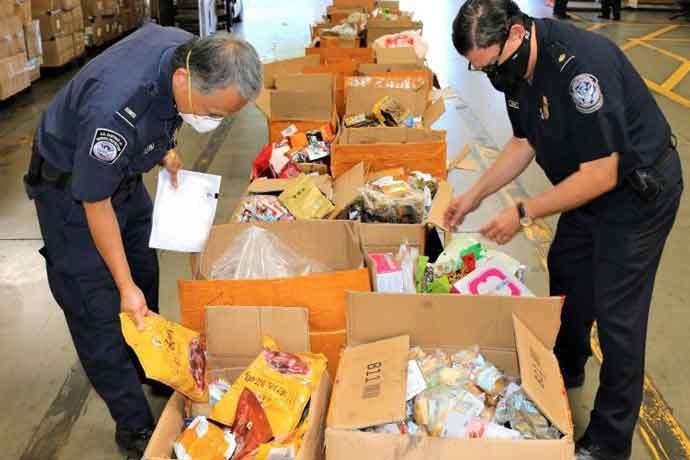LOS ANGELES – In the first five months of fiscal year 2020, the interception of prohibited meats from China at the LA/Long Beach Seaport has increased 70% compared with the same period the year before, said US Customs and Border Protection (CBP), an agency in the Department of Homeland Security.
In roughly eight weeks – April 6 to June 6 – CBP agriculture specialists assigned to the LA/Long Beach Seaport, intercepted 19,555 lbs of prohibited pork, chicken, beef and duck products arriving from China. Specialists identified, examined and seized 12 shipments containing a total of 834 cartons which lacked the required US Department of Agriculture (USDA) entry documentation. Most of the products were hidden in boxes of headphones, door locks, kitchenware, LCD tablets, trash bags, swim fins, cell phone covers, plastic cases and household goods, CBP said.
The seizures are important because China is a country affected by African swine fever (ASF), Classical Swine Fever (CSF), Newcastle Disease (ND), Foot and Mouth Disease (FMD), Highly Pathogenic Avian Influenza (HPAI) and Swine Vesicular Disease (SVD), the agency said. The greatest risks to the US agriculture industry are exotic plant pests and foreign animal diseases. For example, pork products from ASF-affected countries can introduce the virus to the United States, crippling the domestic pork industry and US pork exports valued at $6.5 billion annually.
CBP reports violations to USDA and issues an emergency action for the expedited destruction of the prohibited products.
“Our close collaboration with our USDA strategic partners has resulted in an increased number of prohibited food products interceptions in a relatively short period of time,” said Carlos C. Martel, CBP director of field operations in Los Angeles. “CBP agriculture specialists remain committed and vigilant of foreign animal disease threats.”
In March, President Donald Trump signed The Protecting America’s Food and Agriculture Act of 2019. The bill adds US Customs and Border Protection (CBP) agents, canine teams and other resources aimed at preventing the introduction of animal diseases and pests into the United States.


